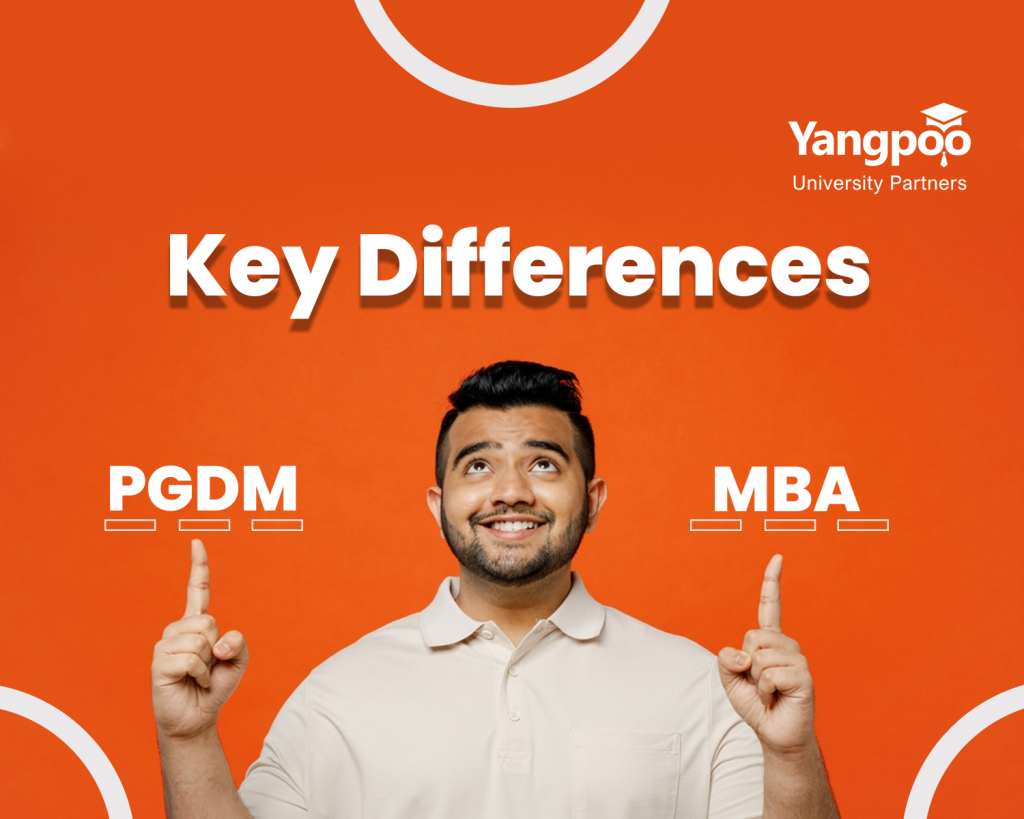Embarking on a postgraduate business education journey often leads to a crucial decision: choosing between a Post Graduate Diploma in Management (PGDM) and a Master of Business Administration (MBA). Both programs promise to sharpen your business acumen and catapult your career to new heights, but they come with distinct features and implications.
Planning for post graduation requires understanding of the differences between PGDM and MBA for making an informed decision that aligns with your career aspirations. Each program offers unique benefits, structures, and opportunities that can significantly influence your educational experience and future prospects. Whether you’re aiming for a specialized role, a leadership position, or a global career, knowing the nuances of each program can help you select the path that best suits your goals.
In this blog, we’ll unravel the key differences between PGDM vs MBA, exploring aspects such as program structure, accreditation, curriculum focus, and career outcomes.
What is a PGDM Degree?
PGDM, or Post Graduate Diploma in Management, is a two-year program equivalent to an MBA offered by autonomous institutions approved by the AICTE.
It provides comprehensive business education, covering subjects like finance, marketing, human resources, and operations. Unlike MBA programs offered by universities, PGDM programs focus on practical learning, often incorporating industry internships and live projects. This curriculum is meticulously designed to bridge the gap between academia and corporate demands, making graduates industry-ready professionals.
Renowned business schools across India offer PGDM programs, providing students with a platform to network with industry leaders and access diverse career opportunities.
What is an MBA?
MBA, or Master of Business Administration, is a postgraduate degree focused on business administration. It equips individuals with a comprehensive understanding of core business functions like finance, marketing, operations, human resources, and strategic management. MBA programs offered by universities and business schools typically span two years, combining theoretical knowledge with practical application through case studies, internships, and live projects. This rigorous curriculum develops critical thinking, leadership, and decision-making skills, preparing graduates for senior management roles across various industries.
The MBA has become a coveted qualification, enhancing career prospects and earning potential. It’s a stepping stone to roles such as consultant, financial analyst, marketing manager, or entrepreneur.
Key Differences Between PGDM and MBA-
While both programs equip graduates with essential management skills, the choice between PGDM and MBA often depends on individual preferences and career goals –
-
Curriculum & Syllabus –
One of the primary distinctions between PGDM vs MBA lies in curriculum flexibility. PGDM programs, offered by autonomous institutions, enjoy greater freedom in designing their curriculum. This allows for more agile adaptation to industry trends and emerging business practices. MBA programs, typically offered by universities, adhere to a more structured curriculum, often with a heavier emphasis on theoretical foundations.
While both PGDM and MBA programs cover core business functions like finance, marketing, and human resources, PGDM programs often incorporate more industry-oriented and specialized subjects. This flexibility enables PGDM programs to tailor their curriculum to specific industry demands and emerging trends.
-
Affiliation and Recognition –
A key distinction between PGDM vs MBA lies in their awarding bodies. MBAs are degree programs conferred by universities affiliated with the University Grants Commission (UGC). PGDMs, on the other hand, are diplomas awarded by autonomous institutions approved by the All India Council for Technical Education (AICTE).
While both formats offer quality management education, the nature of their affiliation impacts factors like curriculum flexibility, industry interactions, and overall program structure.
It’s essential to research the specific affiliations and accreditations of the institution offering the program to make an informed decision.
-
Course Duration –
Both PGDM and MBA programs typically span two years, divided into four semesters. This standardized duration allows students to gain a comprehensive understanding of business management principles. While there might be slight variations in the number of credits or course structure between institutions, the overall time frame remains consistent for both programs.
-
Pedagogy and Teaching Methods –
PGDM programs often adopt a more flexible and industry-oriented approach, incorporating case studies, live projects, and internships extensively.
This practical focus equips students with real-world problem-solving skills. On the other hand, MBA programs tend to follow a more structured curriculum with a balance of theoretical knowledge and practical application. While both programs aim to develop managerial skills, the emphasis on pedagogy varies. Ultimately, the choice between PGDM and MBA depends on individual learning preferences and career goals.
-
Cost of Education –
When comparing the cost of pursuing a PGDM vs MBA, several factors come into play that can significantly impact your financial planning. Tuition fees for PGDM programs typically range from ₹8 lakhs to ₹25 lakhs for the entire course, depending on the institution’s reputation, location, and facilities. Prestigious institutions such as the Indian School of Business (ISB) or Indian Institutes of Management (IIMs) may charge higher fees. Similarly, MBA programs generally fall within the range of ₹10 lakhs to ₹30 lakhs, with costs varying based on the program’s global or local standing and whether it’s offered by a top-tier business school or a university-affiliated college. Global MBA programs, in particular, can be substantially more expensive.
In addition to tuition, both PGDM and MBA students face additional costs. PGDM students might incur expenses for industry projects, internships, and international study tours, potentially adding ₹1 lakh to ₹5 lakhs to their overall costs. MBA students also encounter similar supplementary expenses, which can range from ₹1 lakh to ₹6 lakhs, especially if the program includes international modules or special projects.
-
Financial aid and scholarships –
Financial aid and scholarships play a significant role in offsetting these costs. PGDM programs often provide financial assistance through institutional scholarships or corporate sponsorships, reducing the financial burden. Similarly, MBA programs from reputed institutions typically offer various scholarships and financial aid options based on merit, need, or diversity, which can significantly help manage tuition expenses.
-
ROI – Return On Investment –
Regarding return on investment (ROI), both PGDM and MBA programs can offer high returns, particularly if pursued at well-regarded institutions with strong industry connections. PGDM graduates often secure high-paying roles and enjoy significant career growth, making the investment worthwhile. MBA graduates, especially from top global or Indian schools, generally experience high ROI with better salary prospects and career advancement opportunities, though the initial investment may be higher compared to many PGDM programs.
-
Industry Recognition –
Both PGDM and MBA programs are recognized as valuable qualifications in the business world. However, there can be subtle differences in how they are perceived by specific industries.
PGDM programs often have a strong industry orientation, with a focus on practical skills and real-world applications. This makes them particularly attractive to companies that value hands-on experience and adaptability.
MBA programs offered by universities generally carry a strong academic reputation and are widely recognized across industries. They are often preferred by organizations seeking candidates with a strong theoretical foundation and analytical abilities.
-
Global Opportunities –
MBA programs often have stronger ties with international universities, offering opportunities for student exchange programs, joint degrees, and global internships. This can provide graduates with a broader global perspective and a wider network of international contacts.
PGDM programs are increasingly incorporating international components, such as study abroad options and global projects. While they may not have the same level of international partnerships as some MBA programs, they still offer opportunities to develop a global mindset.
-
Flexibility and Specializations –
PGDM programs are renowned for their flexibility in curriculum design. Autonomous institutions have the freedom to tailor the program to industry trends and student needs. This often translates to a wider range of specializations and electives compared to traditional MBA programs. PGDM programs frequently offer specialized tracks in emerging areas like digital marketing, business analytics, or entrepreneurship.
On the other hand, MBA programs offered by universities tend to have a more structured curriculum with a core set of courses. While specializations are available, the scope might be slightly narrower than PGDM programs. However, the focus on theoretical foundations and research methodologies can be beneficial for those aspiring to academic or consulting roles.
Similarities Between PGDM and MBA –
Despite their distinct nature, PGDM and MBA programs share many commonalities. Both are designed to develop strong business acumen, leadership qualities, and strategic thinking. Core subjects like finance, marketing, human resources, and operations management form the backbone of both programs. Additionally, both PGDM and MBA graduates enjoy similar career prospects across various industries.
PGDM or MBA – Which is Better?
Choosing between a PGDM and an MBA depends largely on your career aspirations and priorities.
PGDM programs often prioritize practical learning and industry exposure, making them ideal for those seeking immediate application of knowledge. The flexibility in curriculum design allows for specialization in emerging areas.
MBA programs, on the other hand, provide a strong theoretical underpinning and are often preferred by those aiming for academic or research-oriented roles. The structured curriculum and university affiliation can be advantageous for higher studies or roles requiring a formal degree.
Ultimately, the best program for you depends on your individual goals and preferences. Consider factors such as desired specialization, career path, and the institute’s reputation when making your decision about PGDM or MBA, which is better.
Colleges Offering MBA or PGDM At Yangpoo
At Yangpoo, we partner with top colleges and universities offering MBA and PGDM programs that are designed to prepare you for leadership roles in various industries. Explore a range of programs tailored to your career goals, from traditional MBA courses to flexible online PGDM options, all curated to help you succeed in today’s competitive business landscape.
- Hybrid PGDM – We school
- MBA from Amity University
- MBA from Manipal
- MBA from DY Patil
- Masters for Business Analytics – Deakin University
Remember, the best program is the one that aligns with your aspirations. So, research thoroughly, compare options, and choose the path that propels you towards your professional goals.
FAQs
Q1. What is the difference between PGP and PGDM?
Ans. A Post Graduate Programme (PGP) is often a shorter, executive-level program focusing on specialized skills and industry trends, while a Post Graduate Diploma in Management (PGDM) is a more comprehensive, typically two-year program offering a broader management education and deeper academic rigor.
Q2. Is PGDM and MBA same?
Ans. No, PGDM and MBA are not the same. PGDM is a diploma offered by autonomous institutes with a focus on industry-relevant, updated curricula, while MBA is a degree offered by universities with a more standardized curriculum. Both have distinct structures and industry recognition.
Q3. Can I pursue a PGDM after completing an MBA?
Ans. Yes, you can pursue a PGDM after completing an MBA. A PGDM can offer specialized skills or practical exposure that complements your MBA, potentially enhancing your career prospects or focusing on a different area of interest.
Q4. Which program offers better global opportunities, PGDM or MBA?
Ans. An MBA generally offers better global opportunities due to its widespread recognition and standardized curriculum, which is valued by multinational corporations worldwide. However, top-tier PGDM programs from renowned institutions also provide strong global prospects through their industry connections and practical focus.
Q5. Can I specialize in the same areas in both PGDM and MBA programs?
Ans. Yes, you can specialize in similar areas such as Finance, Marketing, and Business Analytics in both PGDM and MBA programs. However, the depth and focus of these specializations may vary based on the program’s curriculum and institution.
Q6. How does the course duration of PGDM differ from an MBA?
Ans. PGDM programs typically have a duration of 1 to 2 years, depending on the institution, while MBA programs generally span 2 years. PGDM courses often offer more flexible scheduling and shorter durations, while MBA programs usually follow a more standardized timeline.
Q7. How do the costs compare between PGDM and MBA programs?
Ans. The cost of PGDM programs is often higher than MBA programs, particularly if offered by top autonomous institutes. MBA programs, especially those affiliated with universities, may have lower tuition fees, but costs can vary widely depending on the institution and location.





